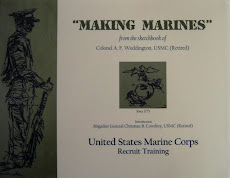THE CIVILITY BRUTALITY PARADOX
By Andy Weddington
Monday, 03 June 2024
Civilize the mind but make savage the body. - Mao Zedong
Humans fight.
For all sorts of reasons - survival to sex to selfishness.
Ergo, civility - man to society - requires effort.
And anything requiring effort to tame that which does not come naturally at times means brutality.
A military's purpose is to fight.
And win.
War is brutal; uncivilized.
Making skilled, competent military officers - lieutenant to general, ensign to admiral - is serious business.
Recently, I read article by a retired officer who quite directly assessed today's senior officers - admirals and generals, noting some exceptions - as incompetent buffoons.
Considering 20 years of war post 9/11 without decisive win and the debacle (13 murdered) leaving Afghanistan, agreement is the only logical conclusion.
But, but, but chimes the in-house chorus.
No buts.
Ahh, the sign on eye-level bookcase shelf behind my battalion commander's desk: Do Not Confuse Effort With Results.
He didn't.
America had warrior admirals and generals during World War II.
Perfect humans? No.
Their enemies brutal.
Americans brutal, too.
Kill or be killed.
We lost.
But won.
Decisively.
They surrendered.
Civility, eventually, restored.
Anymore, I don't know how officers educated, trained, and ever polished.
But something is amiss.
The colonel who aired critical analysis in print also included some solutions.
Without addressing them, well, for starters.
Making competent warriors is an art.
First, there must be cause. Purpose.
In the United States that purpose is our heart - the Constitution; supporting and defending.
No one asked me nor do I ever expect such query but what follows is 11 books that read, digested, integrated, practiced, and constantly reread would go a long way toward making competent warriors ...
1. The Declaration of Independence and the Constitution of the United States of America (The only reason for a powerful, competent military. Know it!)
2. The Art of War by Sun Tzu (Macro to micro. Timeless. Finesse.)
3. Lincoln on Leadership by Donald T. Phillips (Lessons from a revered wartime President.)
4. The Second World Wars by Victor Davis Hanson (Strategic to tactical, an exceptional tome explaining who, what, where, when, why, how. A user's manual.)
5. Brave Men by Ernie Pyle (Americans in all service uniforms fighting in European and South Pacific theaters. Meet the frontlines people. Brutality. Civility. Masterpiece.)
6. With the Old Breed: At Peleliu and Okinawa by E. B. Sledge (Marines in combat. Gallantry not glamour.)
7. The Armed Forces Officer (Department of Defense 1975 edition) (A superb timeless reference - rank moot.)
8. Semantics and Communication by John C. Condon, Jr. (A critical orientation to truth - that words and symbols and what they represent mutually exclusive. Avoiding the trap is sanity.)
9. George Washington's Rules of Civility by John T. Phillips, II (Lessons from a warrior and statesman. He lost some. He won. He was President.)
10. War is a Racket by Smedley D. Butler (Marine Major General twice awarded Medal of Honor offers candid criticism. War is not glorious rather gore for greed.)
11. The Art Spirit by Robert Henri (Because seeing big chunks and solving little pieces is not restricted to warfighting. Nor painting. Relevant.)
A competent warrior is a leader.
Simple enough.
And, by the way, simplicity is a (Sun Tzu) Principle of War.
In closing,
World War II combatants ...
"Civility is not a sign of weakness." - John Fitzgerald Kennedy
"Brutality creates respect." - Adolf Hitler
Human nature is.












No comments:
Post a Comment